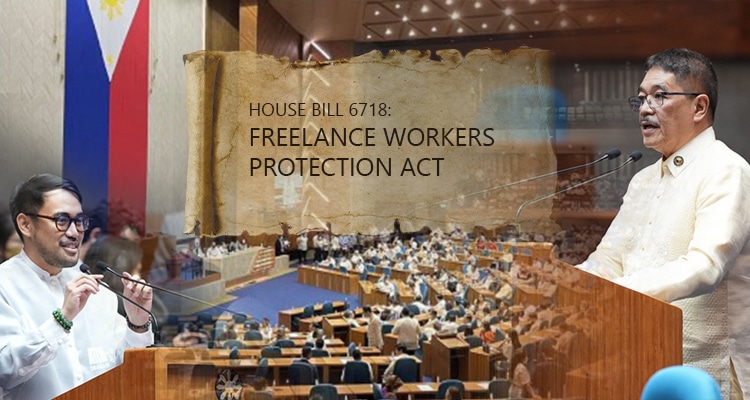Freelancing is a blessing to a lot of people. It allows them more time flexibility for their family or passion projects while earning a living, most in the comforts of their homes.
With the previous pandemic, people who lost their office jobs pivoted to freelancing online. And some of them have embraced this as their full-time career. In fact, around 1.5 Million Filipinos are registered on international online platforms.
But on the flip side, more and more unscrupulous individuals take advantage of aspiring freelancers through work-from-home scams.
So, how can you protect yourselves legally?
House bill 6718: Freelance Workers Protection Act
With this, the house approved House bill 6718 entitled the “Freelance Workers Protection Act.” It aims to protect freelancers, grant labor rights and improve their welfare.
According to the bill, a freelancer is someone “hired or retained to provide services in exchange for compensation” as an independent contractor to do work according to one’s own methods and without being subjected to the control of the hiring party, except only as to the results of the work.
So, whether you serve on a per-project basis or hourly basis, you’re considered a freelancer as long as you’re registered as an independent contractor under SEC or DTI or as a self-employed individual in BIR.
So what are the expected changes and benefits of this bill? Here is what you need to know.
Mandatory BIR Registration and Tax Relief
First of all, all freelancers are mandated by the BIR to register in their revenue district office. The BIR is instructed to create a special lane for freelancers as assistance.
Also, freelancer workers will be granted tax relief within the threshold under Republic Act No. 10963 (Tax Reform for Acceleration and Inclusion Act), and Republic Act No. 9178 (Barangay Micro Business Enterprises Act).
Mandatory Written Contract/s
Unfortunately, some clients don’t pay their freelancers. And freelancers can’t demand the money because there was no written contract for the arrangements.
With the bill, engaging freelancers without a written contract is now punishable by law. A contract should include the following:
- Itemization of all services to be provided;
- Details of compensation and other benefits, including rate, method, and schedule of payment;
- Employment period;
- Grounds for breach of contract on the part of both the hiring party and the freelancer;
- Tax Identification Number (TIN) of the freelancer;
- Other conditions as may be directed by the Department of Labor and Employment (DOLE).
Any changes and modifications made are not allowed unless signed off on by both the hiring party and the freelance worker.
Mandatory Prepayment Before the Start of Service
Most freelancers are paid once they have rendered their services. But some freelancers have to shell out money for materials and other costs for the project in the meantime.
But even if there are no startup costs, most spend hours working only to have their payments delayed, or worse, not get paid at all. And that time could’ve been spent on other projects that could have been more lucrative.
Now, the bill demands that the client hand over a partial payment before the freelancer renders the service. The amount would depend on what’s agreed upon, but it should not be less than 30 percent of the contract price.
Mandatory Hazard Pay and Night Shift Differential Pay
Some freelancers have clients in different time zones, while some have tasks that are hazardous (e.g. freelance stunt performers). For employees, you can get a premium on top of your pay based on the Labor Code.
But your client is not required to pay that premium if you’re a freelancer.
With this bill, you’re now entitled to mandatory hazard pay and night differential pay.
Due Compensation Should Be Paid No Later than 15 days
You heard a lot of stories about freelancers’ compensation payout schedules. Even with a contract, some are paid much later than what was agreed upon. And we’re talking months after payment is due.
How can you pay for your daily expenses if your compensation is delayed for this long?
And some clients exploit this because there’s no heavy legal punishment when they don’t pay on time.
That all changes with this bill.
Right now, compensation should be paid no later than 15 days after it’s due. If not, you can demand additional penalties on top of the compensation due.
Penalties for Payment Less than the Specified Contract Price
Some freelancers just want to get paid. That’s why they resort to accepting compensation below their specified contract price. After all, at least they got paid, right?
With the new bill, this is now considered an unlawful practice subject to a penalty.
Penalties Under the Proposed Law
So if you have complaints, where can you go? You or an authorized representative can file a complaint with the Labor Department through the Undersecretary for Workers with Special Concerns.
The penalty for violating the proposed law is between PHP50,000 to PHP500,000.
With that, if you’re looking for an agency who can and will protect your rights as a freelancer, you can sign up with Remote Staff.
Remote Staff offers long-term career opportunities, depending on your skills.
And for the past years, Remote Staff has guaranteed proper compensation and timely payments for thousands of Remote workers, even without certain laws in place.
Imagine what they can do for you now that the law is on your side?
Sign up today and take your first step towards getting clients that value your worth as a professional. Cheers!









